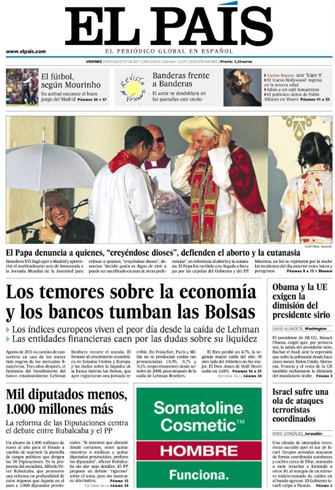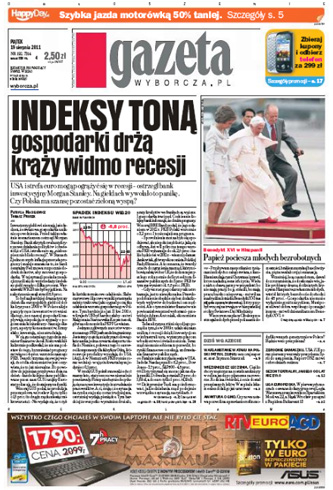 "Fears over banks and the economy cause market collapse," reads the headline in El País.Three years after the crash in the autumn of 2008, "the ghost of Lehman Brothers continues to haunt the world." The daily points out that "European indexes experienced their worst day" since the fall of Lehman and "fears of a recession" have returned in force, because "in the absence of economic growth, debts will remain unpaid." For El País, this is particularly the case “in the eurozone, where the European Central Bank and a majority of national governments have ignored the threat of stagnation, and adopted deflationist policies." The Spanish daily argues that what are needed are strategies "to promote growth and increase market confidence," which will be difficult to restore "in the wake of so much excessive austerity rhetoric."
"Fears over banks and the economy cause market collapse," reads the headline in El País.Three years after the crash in the autumn of 2008, "the ghost of Lehman Brothers continues to haunt the world." The daily points out that "European indexes experienced their worst day" since the fall of Lehman and "fears of a recession" have returned in force, because "in the absence of economic growth, debts will remain unpaid." For El País, this is particularly the case “in the eurozone, where the European Central Bank and a majority of national governments have ignored the threat of stagnation, and adopted deflationist policies." The Spanish daily argues that what are needed are strategies "to promote growth and increase market confidence," which will be difficult to restore "in the wake of so much excessive austerity rhetoric."
 “Has Europe run aground?” wonders the front page of Handelsblatt. For the German economic daily, Merkel and Sarkozy’s proposals "are certainly not the sole cause of the panic among stock market investors.” The real fear is that “Europe will go bankrupt: the Americans are concerned that the problems of the European banking sector will undermine its institutions." The newspaper continues: "Many commentators are arguing that Europeans should either allow the euro to collapse or construct a sort of United States of Europe. But this latter option will take time. Alternatively, if it is impossible for them to guarantee states, at least they should safeguard some credibility by guaranteeing banks. This would alleviate the panic among investors, and allow them to avoid spending billions of euros for nothing."
“Has Europe run aground?” wonders the front page of Handelsblatt. For the German economic daily, Merkel and Sarkozy’s proposals "are certainly not the sole cause of the panic among stock market investors.” The real fear is that “Europe will go bankrupt: the Americans are concerned that the problems of the European banking sector will undermine its institutions." The newspaper continues: "Many commentators are arguing that Europeans should either allow the euro to collapse or construct a sort of United States of Europe. But this latter option will take time. Alternatively, if it is impossible for them to guarantee states, at least they should safeguard some credibility by guaranteeing banks. This would alleviate the panic among investors, and allow them to avoid spending billions of euros for nothing."
 “Europe's burning” headlines Il Manifesto, which predicts that “the much feared double-dip recession is imminent. And nothing seems to have changed since the crash of 2008.” The daily argues that international finance is to blame: “states mobilised to save the financial system, and in so doing, undermined their own viability and were forced to implement desperate cuts in social spending. Following the first wave of cuts, the financial system made a brief show of gratitude and then the speculation resumed. Nothing more was heard of the pledge to introduce greater regulation of financial markets. But states are no longer a source of fresh money, they are part of the problem. That is why the measures proposed by Merkel and Sarkozy would not have been sufficient to reassure markets even if they had been a thousand times more intelligent.”
“Europe's burning” headlines Il Manifesto, which predicts that “the much feared double-dip recession is imminent. And nothing seems to have changed since the crash of 2008.” The daily argues that international finance is to blame: “states mobilised to save the financial system, and in so doing, undermined their own viability and were forced to implement desperate cuts in social spending. Following the first wave of cuts, the financial system made a brief show of gratitude and then the speculation resumed. Nothing more was heard of the pledge to introduce greater regulation of financial markets. But states are no longer a source of fresh money, they are part of the problem. That is why the measures proposed by Merkel and Sarkozy would not have been sufficient to reassure markets even if they had been a thousand times more intelligent.”

Do you like our work?
Help multilingual European journalism to thrive, without ads or paywalls. Your one-off or regular support will keep our newsroom independent. Thank you!
















